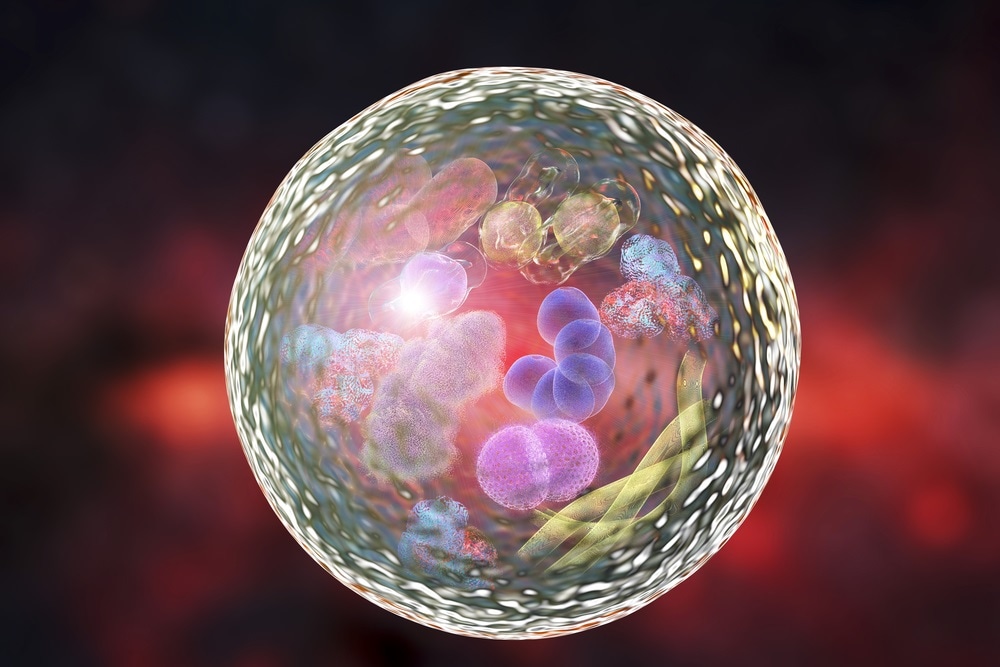A key characteristic of cancer cells is their ability to uncontrollably grow and divide at excessive rates, proliferating and invading other areas of the body besides the primary site. Over the decades, a number of significant advances have been made in treatments that target and prevent this growth, as well as in understanding why it happens. Now, a team of scientists at Uppsala University, Sweden, has advanced this knowledge further, revealing that alterations in cells’ lysosomes underly abnormal cell growth.
 Image Credit: Kateryna Kon / Shutterstock.com
Image Credit: Kateryna Kon / Shutterstock.com
The link between lysosome activity and cancer
Humans have evolved many mechanisms that control cell growth, preventing abnormalities and uncontrollable growth. However, in cancer, it is evident that something goes wrong with one or multiple of these processes.
Research has begun to mount during recent years that is elucidating the role of the cell’s lysosomes in controlling these regulatory processes, including maintaining metabolic homeostasis. Much research has demonstrated that these mechanisms are often occurring on the membrane of the lysosomes.
Lysosomes are a crucial part of the cell’s defense against invading viruses and bacteria, as well as in the management of a healthy cell, breaking down excess or damaged cell parts, and in the scenario where the cell is beyond repair, the lysosome is important in the process of apoptosis, a form of programmed cell death. The organelles, known as the cell's degradation hubs, exist within the cell’s cytoplasm and contain digestive enzymes within its membrane which break down molecules/bacteria/viruses that they engulf.
Previous research has uncovered that the lysosome plays an essential role in the establishment and progression of a variety of diseases, such as cancer which has made it a focal point for research teams looking to develop novel therapeutic interventions.
There may be hundreds of lysosomes present in a cell and these numerous organelles arrange themselves into complex networks. It has been observed that alterations in these networks are common in cancer cells, however, until now scientists have not known exactly how this impacts the progression of the tumor.
While the role of lysosomes in catabolism and recycling has long been known, which is related to growing cancerous cells from the inside, more recent studies have uncovered that lysosomes are also vital in the process of metabolic growth signaling. Evidence has shown that the uncontrolled growth that characterizes cancer cells follows deviation from normal metabolism.
For this reason, the team at Uppsala University decided to further investigate the role of the lysosome in cancer.
The mTOR protein and cell growth
In a study published today in the journal Nature Communications, the Swedish team concludes how their new study provides evidence of the lysosomes causing abnormal cell growth in cancer cells.
The study found that cellular growth is impacted by the number of lysosomes in the network due to the activation of the mTOR protein. Previous research has uncovered that mTOR is responsible for the regulation of cell growth, and is the link between available nutrients and anabolic and catabolic processes. Recently, excitement has grown over the potential to target mTOR to treat cancer as well as neurological diseases.
In the current study, scientists observed that an increase in the number of lysosomes led to hyperactivation of the mTOR molecules on the surface of the lysosomes. Because of its role in increasing cell growth, their hyperactivation led to the uncontrolled growth that is characteristic of cancer.
In addition, the team identified Rap1 as a protein that is involved in the regulation of the lysosomal network’s structure and organization, as well as the number of lysosomes it encompasses.
While still in its early stages, the study is important in demonstrating the role that lysosomes play in governing cell growth. Shortly we can expect to see more investigations take place to gain further insights into how these processes are linked with cancer.
Source:
Changes in cellular degradation hubs can lead to cancer. Nature Communications. Eurekalert. Available from: http://dx.doi.org/10.1038/s41467-020-15156-5